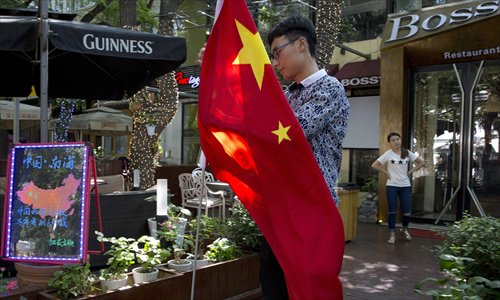HOME >> CHINA
South China Sea arbitration ruling spurs new wave of patriotism
By Liu Xin Source:Global Times Published: 2016/7/13 20:53:00

A restaurant employee prepares to hoist China's national flag near a drawing of the country with the words "China, South China Sea, China's territorial right does not need arbitration," in Beijing on Wednesday. Photo: AP
The award of an arbitral tribunal over territorial claims in the South China Sea has triggered a new wave of patriotism among Chinese, with many expressing on social media their wish to defend national interests.
Thousands of Chinese people posted a map of China with the red nine-dash line and a slogan saying that "China will not lose a single 'dot' of its land" on Sina Weibo and WeChat. The South China Sea topic on Sina Weibo has received more than 3.6 billion views and 5.86 million comments as of press time.
The arbitration tribunal in The Hague Tuesday ruled that there was no legal basis for China to claim historical rights to resources within the sea areas falling within the nine-dash line.
The online activity has expanded to overseas social media with many Chinese celebrities posting Chinese maps or comments in support of China's stance on their Twitter, Facebook and Instagram accounts.
An online campaign from netizens who post on patriotic online forum Di Ba started posting supportive comments under Chinese celebrities, including movie star Li Bingbing, and Lu Han, 25-year-old former member of mega boy band EXO, after their posts had been flooded by critical comments from Vietnam and the Philippines.
"These stars are as patriotic as any of us, even though we may not be their fans, we can't let others bully them for their patriotism," read the post from the official account of "Di Ba crusade to FB."
"It is understandable to see an increase in patriotism among Chinese since the arbitration on the South China Sea harms our national interests and many choose to express their dissatisfaction on social media," Hu Xingdou, a professor at the Beijing Institute of Technology, told the Global Times.
Boycott mangoes
Many Chinese from different fields vowed to contribute their own efforts to fight for the country, especially in the event of a military conflict.
A veteran from Central China's Hunan Province, surnamed Chen, posted a picture of him in military uniform on his Sina Weibo account on Wednesday. Chen told the Global Times that "we are prepared to return to our units and are willing to fight to defend our territorial integrity."
Many veterans echoed Chen by making posts with the hashtag "prepare to oblige under the call." The People's Liberation Army (PLA) Daily posted a picture of a notice on Sina Weibo, showing that a veteran in Hunan who served in the navy was recalled to his unit to perform an unspecified task from July 10 to 22.
"Some navy veterans have been recalled to participate in drills and they could operate vessels skillfully after a short period training," according to the PLA Daily.
Xiangya Hospital of Central South University in Hunan Province released an article on its WeChat public account on Wednesday, saying that 13 of its staff have been called to join in a drill on medical treatment on the sea and that all doctors are prepared to answer the country's call to "ensure China not to lose a little bit of its territory."
Vendors who sell snacks, especially imported dried mango from the Philippines on Taobao, China's largest online shopping platform, began to change their advertisements into "we boycott any products made in the Philippines" and "the rise and fall of the nation is the concern of every Chinese and our dried mango comes from Thailand and the Guangxi Zhuang Autonomous Region, not the Philippines."
According to statistics from the Philippines Department of Agriculture, mango is the third most important fruit crop of the country based on export volume after bananas and pineapple. In 2011, Philippines had an existing production area of 187,073 hectares. The mango industry supports about 2.5 million farmers.
"Making Chinese Net users' voices heard via overseas social media will help the outside world understand our people's stance," Hu said, adding that however the country should prevent patriotism growing into jingoism or populism.